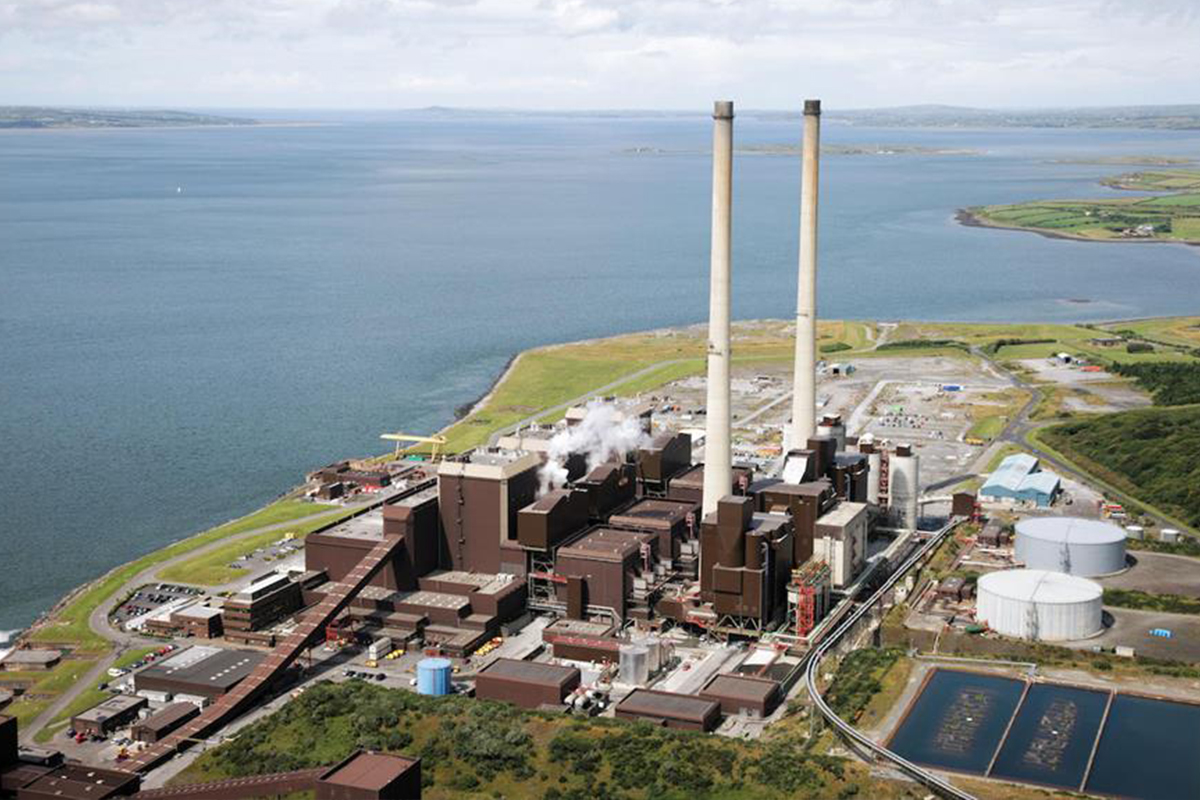Ireland’s largest electricity generation station and only coal-fired power station, Moneypoint, on the River Shannon in Kilrush, County Clare, is to be turned into a massive green energy hub.
The republic’s Electricity Supply Board (ESB) announced Green Atlantic @ Moneypoint, which will see the site be turned into a green energy hub.
The new US$60 million Sustainable System Support facility, the largest of its kind in the world, will provide a range of electrical services to the electricity grid, which would previously have been supplied by thermal fired power stations. Its operation will enable higher volumes of renewables on the system.
Moneypoint floating offshore wind farm: A floating offshore wind farm of 1,400 megawatts will be developed off the coast of Counties Clare and Kerry in two phases by ESB and joint venture partners, Equinor, a world leader in floating offshore wind technology. Once complete, the wind farm will be capable of powering more than 1.6 million homes in Ireland. The wind farm is expected to be in production within the next decade.
A wind turbine construction hub: Moneypoint will become a centre for the construction and assembly of floating wind turbines. A deep-water port already exists at the site, making it an ideal staging ground for the construction of the wind farm. It is expected this will generate a significant number of direct jobs. In the longer term, the development of Moneypoint will support wider plans of Shannon Foynes port, and working with local stakeholders, help make the Shannon Estuary a focal point for the offshore wind industry in Europe.
Hydrogen energy: ESB’s plans include investment in a green hydrogen production, storage and generation facility at Moneypoint towards the end of the decade. A clean, zero-carbon fuel, green hydrogen will be produced from renewable energy and used for power generation, heavy goods vehicles in the transport sector and to help decarbonise a wide range of industries such as pharmaceuticals, electronics and cement manufacturing.
Ireland Government’s ambition is to reach net zero emissions by 2050. Moneypoint was already scheduled for closure “no later than 2025”.
“ESB’s Brighter Future strategy is anchored in our ambition to lead the transition to a low-carbon energy future, powered by clean electricity,” said Pat O’Doherty, ESB CEO.
“The transformation of Moneypoint into a green energy hub will be a major step in achieving this and will bring huge benefits to the Mid-West and beyond. We have long signalled our intention to cease burning coal at Moneypoint.
“Today we are unveiling plans for a reimagined Moneypoint, which will not only create hundreds of jobs, but will also help Ireland to meet its climate targets and maintain secure supplies of electricity into the future,”
Built in the 1980s, Moneypoint once produced 25 per cent of Ireland’s electricity requirements, helping to reduce the country’s dependence on imported oil. Subsequently with the increase in natural gas and renewables in the national energy mix, coal’s importance has waned.
According to the Sustainable Energy Authority of Ireland, in 2018, coal and peat accounted for 40 per cent of the country’s carbon emissions from electricity generation and accounted for just 14 per cent of electricity generated, with each providing similar levels of generation to the grid.
“Today’s announcement is a significant milestone in ESB’s low-carbon journey, cementing our commitment to transforming our generation portfolio and ongoing investment in renewable energy technologies,” said Jim Dollard, ESB Executive Director, Generation and Trading.
“Moneypoint has played a critical role in the country’s energy supply for almost 40 years. We are proud that it will continue to have a crucial role in Ireland’s energy future with many benefits for the local community and wider society.”







